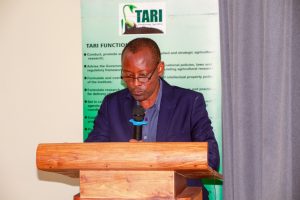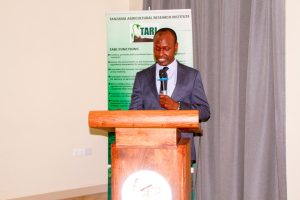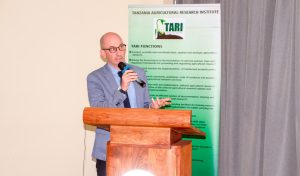
By Valentine Oforo, Dodoma
LOCAL agricultural pundits are working to finalize some key issues in readiness to embark on implementation of a major project meant to tame effects of soil acidity towards the crops production sector in the country. Soil acidity refers to the concentration of hydrogen and aluminium in soils.
At least 32.7 million hectares of land in Tanzania are acidic, being about 14.6 million hectares which are currently under cultivation, the situation which is thwarting the needed metamorphosis in the country’s crops production and productivity.
Among the tall effects of soil acidity to crop production include a sharp decrease availability of essential nutrients to crops, increased concentration of toxic elements (Aluminium) in soils thus damaging crop roots, decrease crop production, and affect essential soil biological functions like nitrogen fixation, to mention but a few.
The envisaged robust initiative to be executed through the Guiding Acid Soil Management Investments in Africa (GAIA) project focuses on impart the farmers who are cultivating in soil acidity zones with agronomic knowledge on how to use agriculture limes to help treat the soil.
Bankrolled by Bill & Melinda Gates Foundation, the research-based project is being executed jointly in the country by several agricultural institutions, led by the Tanzania Agricultural Research Institute (TARI), and it is further targeting to address key knowledge gaps related to soil health management and improved agronomy among the farmers.
As part of the project’s pilot leg, special study trials were conducted among the farmers in Geita and Mbozi districts, focusing on the use of agricultural limes to help treat the acidic soil.
And during a series of potential 43 trials that were conducted in each of the two picked districts, maize and beans were the tested crops, and the treatments included control received the same amount of fertilizers, but applied with different rates of ag-lime.
Earlier this week, TARI organized a special agro-technical meeting in Dodoma Capital City, attracted high-profile agricultural researchers from diverse institutions from within and outside the country that are part and parcel of the project to deliberate and set a crucial road map to use the findings from the project’s trials studies to venture onto implementation of the helpful initiative across all areas with acidic soils in the country.
The institutions include the Southern Agriculture Growth Corridor of Tanzania (SAGCOT), Alliance for Green Revolution in Agriculture (AGRA), International Maize and Wheat Improvement Center (CIMMYT), Center for Agriculture and Bioscience International (CABI), Rwanda Agriculture and Animal Resources Development Board (RAB), Kenya Agricultural and Livestock Research Organization (KALRO), to mention but a few.

In his remarks to open the workshop, the Director for Crops Development for the Ministry of Agriculture, Nyasebwa Chimagu, who officiated the meeting, expressed that increasing crops production and productivity was among the currently priorities by the parent ministry, saying to attain the vision, knowledge on soil health management among the local farmers was of paramount important.
“The project has surfaced at a proper period as the government is striving to push the sector’s annual growth to the tune of 10 percent by 2030, and thus, limiting effects of soil acidity is vital to enable the sector to grow to that effect,” he said.
Chimagu urged members of the meeting to ponder over the proper approach to which the project will apply to have the farmers under soil acidity adopting proper use of ag-limes.
“Majority of the farmers are not aware of the use of ag-lime as they have for years been sensitized to only use fertilizer, so the project must come-up with a useful and simple approach to empower them,” he suggested.
And he added, the project must sensitize the lime producing factories to expand production so as to ensure for availability, accessibility and affordability of agricultural limes towards the intended farmers in the needed areas.
Adding his voice to the meeting’s objectives, the Director General (DG) of the Tanzania Agricultural Research Institute (TARI), Dr Thomas Bwana, observed that acidic soils was standing tall among the major factor that diluting efforts by the country’s agriculture system to attain the needed crops production and productivity.
He added, the so far conducted trials by TARI in Mbozi and Geita have proved that use of ag-limes can help to double maize yields in acidic soil areas.
“Currently, we’re continuing carrying out more research to determine all areas of the country where farmers must use agricultural limes, as well as the actual extent that the farmers are supposed to use limes to get good results in their plantations,” he unveiled.
Together with that, the director added that throughout the project the state-owned agro-research institute will introduce to the farmers key knowledge to help solve the various challenges that deny the farmers to yield bumper.

Jordan Chamberlin, the Senior Economist Research Land, Inclusive Rural Transformation Sustainable Agrifood Systems Program (SAP) at the International Maize and Wheat Improvement Center (CIMMYT), in his presentation expressed that several governments in East Africa, including Tanzania, have initiated discussion on substantial investments in the rehabilitation of acid soils.
“The project’s primary target include Ethiopia, Kenya, Tanzania, RwandaEastern & Southern Africa and West Africa,” he expounded, added.
In his presentation, entitled ‘Guiding Acid Soil Management in Tanzania’, Dr Sibaway Mwango, the National Coordinator Agricultural Natural Resources Management from TARI detailed that although agriculture plays a vital role to the livelihood of Tanzanians, the sector is however facing many challenges which impede crop productivity and production.
The challenges, according to him incorporate low knowledge of soil health, inappropriate use of fertilizers, depleted soil fertility, inappropriate agronomic practices, and low knowledge on land suitability (where to grow what).
“There are two types of soil acidity, active and exchangeable soil acidity, whereby active soil acidity is easy to measure and can easily be corrected by liming, but it is difficult to measure exchangeable acidity as you are required to measure aluminium and hydrogen concentrations,” he observed.
He informed that, at present in Tanzania, aluminium cannot be measured by neither soil scanners, nor pH meters as its correction may require huge amounts of lime and many cycles of re-application.
Detailing over the acidity saturation in soils of Tanzania, Dr Mwango said about 53 percent to 71 percent of applied fertilizers are lost, which means for every 100/- invested in fertilizers between 53/- and 71/- are not beneficial to the crop.
Wrapping up the meeting, the involved stakeholders informed that, combining ag-lime and mineral fertilizers in appropriate rates can possibly increase yield three times for maize, and two times for bean, respectively in Geita district, whereby the trials proved that maize increased from 5bags/acre to 15bags/acre, and beans increased from 1.0bag/acre to 3.3bags/acre.
According to them, the same treatment increased yield 1.8 times and 1.7 times for maize and beans, respectively in Mbozi district, in which maize increased from 10bags/acre to 18bags/acre, and beans increased from 2.0 bags/acre to 3.4bags/acre.
And it was concluded in acidic soils that application of fertilizers alone without liming cannot increase crop yields appreciably.
Pertaining to policy implications, the gathered agro experts observe that the use of fertilizers alone does not give desired crop yield levels due to soil acidity problems because soil acidity causes between 20 and 80 percent loss of fertilizers applied in acid soils.
They said lime application will correct this loss if targeted to the areas and thus, it is recommended to develop a program that makes lime easily accessible to farmers
Moreover, they stated that lime availability is limited in areas affected by acid soils and however, lime deposits are located in areas where acidity is a problem. It is recommended that , according to them, the government must encourage investment in lime factories to make availability closer to farmers.
The sector contribute to 28 percent of the country’s Domestic Gross Product (DGP) as well as 24 percent of the total export, the agricultural thing-tanks in the country have realized the imperative of bridging agro-scientific expertise and strategies to help overcoming the negative effects of soils acidity towards crops production in Tanzania.



